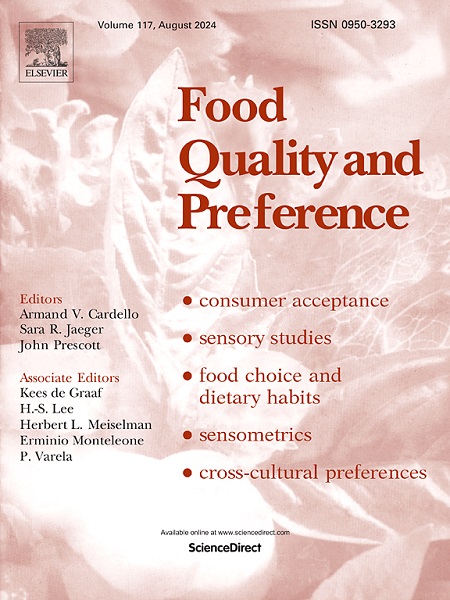Perceived environmental impact of food: Upgrading of domestic products and downgrading of imported products
IF 4.9
1区 农林科学
Q1 FOOD SCIENCE & TECHNOLOGY
引用次数: 0
Abstract
The heuristic ‘our own country is best’ may shape consumers' perceptions of a product's environmental impact – yet it does not always hold true. To analyze the influence of country-of-origin (COO) information, this study examines how consumers in Germany evaluate the environmental impact of three food products (bell peppers, apples, and beef) based on their stated COO. We compare perceptions of products labeled as domestic, EU-imported, non-EU-imported, and without mentioning any COO information. Results reveal that domestic products are perceived as more environmentally friendly than EU imports while EU imports are perceived as more environmentally friendly than non-EU imports – especially in the case of fruits and vegetables. Compared to identical products without COO information, domestic products were not rated more environmentally friendly but were even downgraded. This suggests that the ‘our own country is best’ heuristic cannot fully explain consumer perceptions of environmental impact. Yet, imported products were consistently downgraded, even for imported bell peppers, which are often more environmentally friendly than domestic alternatives in Germany. Our findings imply that COO labeling should be differentiated and supported by consumer education to avoid unintended environmental consequences, especially when imported products outperform domestic alternatives.
感知食品的环境影响:国内产品的升级和进口产品的降级
启发式的“我们自己的国家是最好的”可能会影响消费者对产品环境影响的看法——但它并不总是正确的。为了分析原产国(COO)信息的影响,本研究考察了德国消费者如何根据他们陈述的COO来评估三种食品(甜椒、苹果和牛肉)对环境的影响。我们比较了国产、欧盟进口、非欧盟进口产品的认知,并没有提及任何COO信息。结果显示,国内产品被认为比欧盟进口产品更环保,而欧盟进口产品被认为比非欧盟进口产品更环保——尤其是水果和蔬菜。与没有COO信息的同类产品相比,国产产品的环保评级非但没有提高,反而被降级。这表明,“我们自己的国家是最好的”启发式不能完全解释消费者对环境影响的看法。然而,进口产品一直被降级,即使是进口甜椒,在德国,进口甜椒往往比国内替代品更环保。我们的研究结果表明,COO标签应该加以区分,并得到消费者教育的支持,以避免意外的环境后果,特别是当进口产品优于国内替代品时。
本文章由计算机程序翻译,如有差异,请以英文原文为准。
求助全文
约1分钟内获得全文
求助全文
来源期刊

Food Quality and Preference
工程技术-食品科技
CiteScore
10.40
自引率
15.10%
发文量
263
审稿时长
38 days
期刊介绍:
Food Quality and Preference is a journal devoted to sensory, consumer and behavioural research in food and non-food products. It publishes original research, critical reviews, and short communications in sensory and consumer science, and sensometrics. In addition, the journal publishes special invited issues on important timely topics and from relevant conferences. These are aimed at bridging the gap between research and application, bringing together authors and readers in consumer and market research, sensory science, sensometrics and sensory evaluation, nutrition and food choice, as well as food research, product development and sensory quality assurance. Submissions to Food Quality and Preference are limited to papers that include some form of human measurement; papers that are limited to physical/chemical measures or the routine application of sensory, consumer or econometric analysis will not be considered unless they specifically make a novel scientific contribution in line with the journal''s coverage as outlined below.
 求助内容:
求助内容: 应助结果提醒方式:
应助结果提醒方式:


